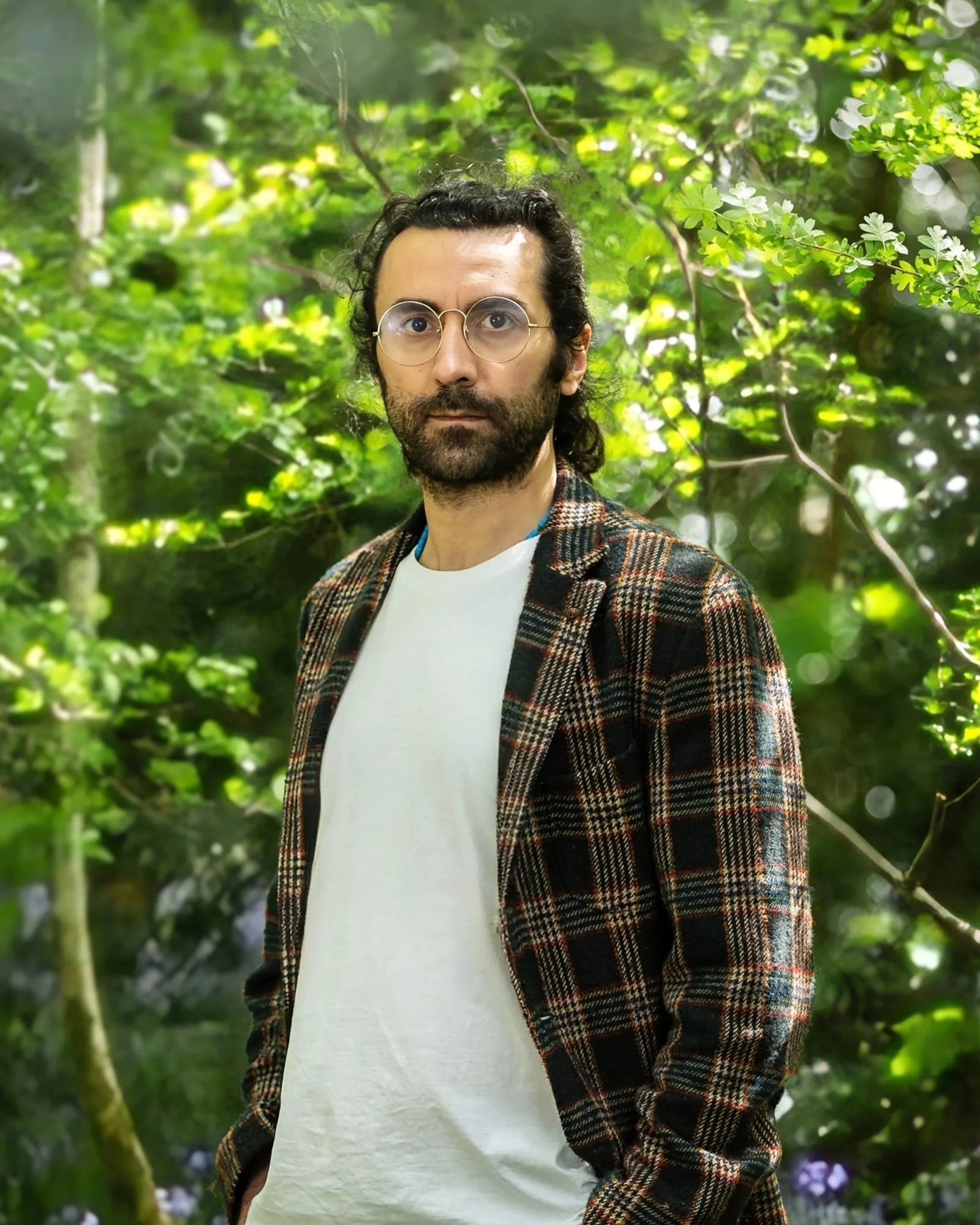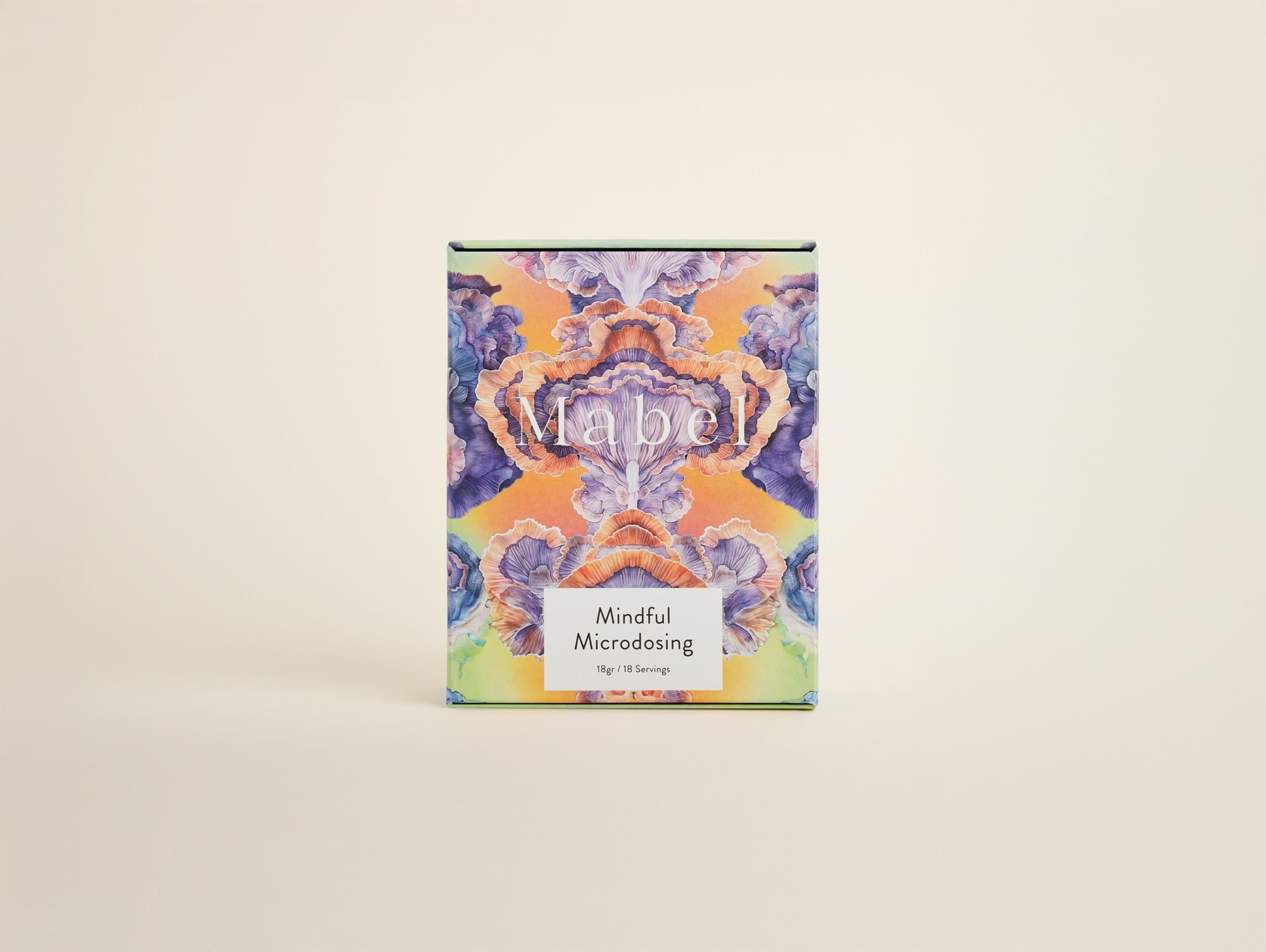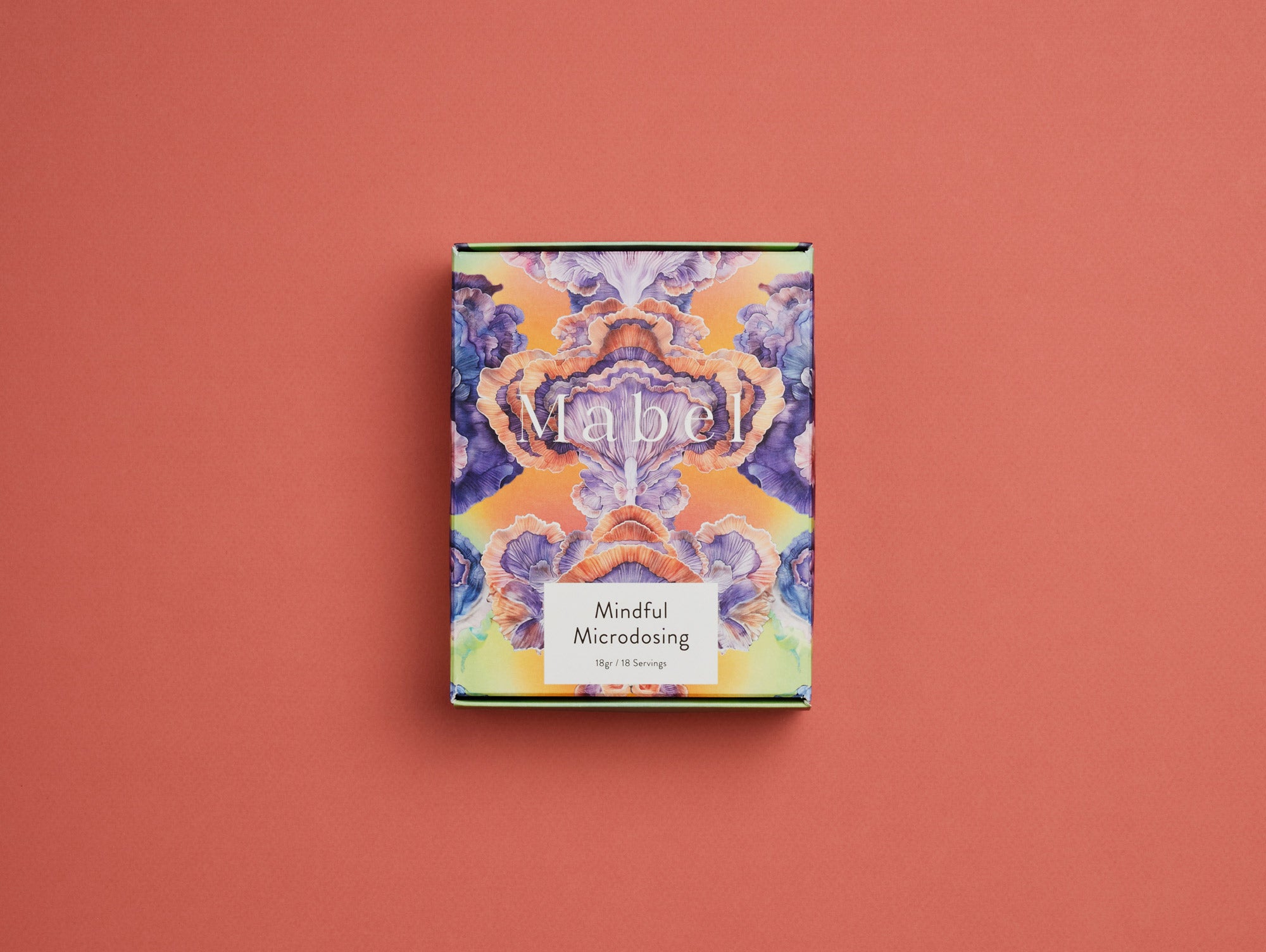We’re excited to introduce Amir Lotfi, our Chief Scientific Officer at Mabel. In addition to his pivotal role with us, Amir serves as Senior Director at Beckley Psytech, the renowned institution founded by Lady Amanda Feilding and others. Amir’s extensive expertise in neuroscience, pharmacology, molecular biology, and biochemistry has made him an invaluable partner in shaping Mabel’s mushroom-based products. A distinguished neuroscientist and expert in the field of psychedelics, he is dedicated to advancing the mental wellbeing of women, with a deep focus on the therapeutic potential of psilocybin.
To start, could you please share a bit about your background and what led you to focus on psychedelics and their impact on mental well-being?
Sure. As a basic scientist, I have a background in neuroscience and drug development, which naturally fueled my interest in how various compounds interact with the brain to influence behavior, mood, and cognition. Early in my career, I came across the work of Lady Amanda Feilding, whose research and advocacy for psychedelics as tools for understanding the brain and improving mental health truly inspired me.
What captivated me most was the potential of psychedelics to provide effective treatments for neuropsychiatric disorders—conditions like depression, anxiety, and PTSD—using intermittent dosing, with a long-lasting therapeutic effect (if/when used in proper conditions). This approach stands in contrast to the daily (and at times out-dated) medications we often rely on, offering the possibility of long-lasting benefits with just a few administrations.
At the same time, I was struck by the history of these compounds, and the societal and cultural baggage that they come with. The fact that they were banned for decades, even for research purposes, felt like a missed opportunity to advance science and medicine for the past several decades.
That sense of frustration only deepened my curiosity, motivating me to explore their potential and advocate for evidence-based approaches to bring them into modern therapeutic settings.
Understanding Psilocybin
Q: To start, could you explain what psilocybin is and how it works in the brain? What makes psilocybin a ‘psychedelic’ compound? How is it different from other substances that impact the brain?
The term "psychedelic" comes from Greek roots meaning "mind-manifesting." Psychedelics like psilocybin are unique because they temporarily amplify sensory, emotional, and cognitive experiences, often leading to profound shifts in perspective or understanding.
Psilocybin is a naturally occurring compound found in certain types of mushrooms, commonly referred to as "magic mushrooms." Once consumed, psilocybin is converted in the body into its active form, psilocin, which interacts with the body and brain to produce its effects.
Q: Can you walk us through the neurological process—what happens at a brain level when someone consumes psilocybin?
Psilocybin primarily works by binding to serotonin receptors, which are involved in regulating mood, cognition, self awareness, and perception. This interaction leads to temporary changes in the way brain networks communicate, creating the characteristic effects of increased sensory perception, altered thinking patterns, and intense emotional experiences.
What sets psilocybin (and most other psychedelics) apart from other substances that affect the brain is its ability to induce these experiences without being addictive or causing physical dependency in most of their users. Unlike stimulants (like caffeine or amphetamines) that increase alertness, or sedatives (like alcohol or benzodiazepines) that calm the brain, psychedelics like psilocybin work by enhancing communication between normally segregated brain regions. This increased "cross-talk" leads to the vivid imagery, new insights, and emotional breakthroughs that people often describe.
Micro & Macro-doses
Here I want to make a distinction between macrodosing and microdosing. A macrodose (or a “full” dose) is an amount of psilocybin (or mushrooms) that induces profound shifts in perception and thought patterns, also commonly referred to as a “trip”. It’s intended for deep therapeutic or spiritual practices, and induces intense emotional breakthroughs and profound shifts in the individual’s worldview. These can be transformative experiences for most people, but also require careful consideration, controlled settings, preparation prior and integration afterwards.
A microdose, on the other hand, is taking a small dose, usually smaller than 10% of a macrodose, also referred to as a “sub-perceptual” dose, and likely with no noticeable changes in sensory processes, unlike a full “trip”. A microdose induces subtle changes in mood, creativity, focus, and emotional resilience, and increases motivation, mindfulness, and productivity.
Due to no (or very minimal) change in perceptual processes, microdosing can be incorporated into daily life practices and during normal daily activities.
The Science of Psilocybin
Q: Psilocybin is often viewed with skepticism due to its stigma. How safe is it when used appropriately? Are there any side effects and is it safe for everyone?
Psilocybin has a positive physiological safety profile, where even consuming large doses can be relatively safe in an otherwise healthy individual. Groups that are recommended to stay away from Psilocybin are individuals with heart conditions, and with self or family history of psychosis or other serious similar mental health issues. Also individuals on a medication that interferes with metabolism of psilocybin (including but not limited to mono-amine oxidase inhibitors) should avoid taking psilocybin. Combination with other psychoactive compounds (including alcohol ideally) should also be avoided. It is also important to avoid it in case one is pregnant or breastfeeding. Science is very much in its early stages for understanding these risks, so consultation with a professional is important in case of any uncertainties or other conditions.
Psychological safety is another factor to consider, especially for taking a macrodose. In this case, the importance of a set and settings and a knowledgeable companion should be emphasized to avoid psychological distress and better management of possible fear/stress associated with ego dissolution
The Power of Psilocybin
Q: Why is psilocybin such a powerful tool for mental well-being, especially for women?
Compared to Men, Women are more susceptible to mental health disorders, including depression and substance use disorder (addiction). There is a huge gap in research and development of compounds that are beneficial and specific for women’s conditions, and therefore psychedelics can present a promising tool for management and treatment of women’s mental health.
Q: We hear a lot about psilocybin’s potential in treating conditions like depression and anxiety. How does it work to alleviate these conditions?
Unlike many treatments for mental health conditions, psilocybin doesn’t just mask symptoms; it addresses underlying thought patterns and emotional processing. It’s also a holistic approach to mental health, with a positive impact on the psychology and biology of the individual and combined with its ability to work in intermittent doses, psilocybin represents a promising, innovative approach to mental health treatment that’s gaining attention in scientific and medical communities.
One of the most interesting effects is the suppression of activity in a brain network called the default mode network (DMN). This network is responsible for our sense of self, introspection, and habitual thought patterns. When its activity decreases, people often experience what’s called ego dissolution, a state where the boundaries between the self and the world seem to blur, fostering a sense of interconnectedness.
Psilocybin enhances communication between brain regions that don’t normally interact much. This creates new patterns of activity, which is why people often describe feeling "unstuck" from rigid ways of thinking.
Psilocybin also promotes neuroplasticity—the brain’s ability to form new connections. This is believed to play a role in the lasting therapeutic benefits seen in conditions like depression and PTSD, where individuals would benefit from relearning and de-learning (especially the traumatic experiences or chronic negative thought patterns), they may feel "reset" or able to reframe negative experiences.
Q: Are there any specific benefits psilocybin offers that may be especially relevant for women’s mental health?
Psilocybin affects more than just the brain in fascinating ways, it could be labeled as a holistic approach. It helps regulate emotional processing, making it easier for people to manage stress and negative emotions. It may also play a role in balancing hormones, like cortisol, which can reduce the effects of chronic stress on the body. Even more exciting, psilocybin has the potential to reduce inflammation, a key factor in many mental and physical health issues. And let’s not forget the gut-brain connection—psilocybin might positively influence this relationship, potentially improving digestion, reducing stress-related gut symptoms, and enhancing mental well-being.
In short, psilocybin's benefits go beyond the brain, offering a holistic approach to improving both mental and physical health.
Psilocybin for Burnout and Stress
Q: For individuals suffering from burnout or mental fatigue, can psilocybin provide any relief? How does psilocybin help the brain reset, particularly for those who feel mentally exhausted or overwhelmed?
Psilocybin could provide a promising way to address stress, burnout, and mental exhaustion, which have become widespread issues in today’s fast-paced world. By promoting a positive mood and being in the present, psilocybin allows individuals to approach challenges with more resilience and composure, one step at a time. Instead of feeling overwhelmed or stuck in cycles of frustration (or always thinking about the “worst case scenarios”), people often report feeling more balanced and better equipped to handle life’s demands.
Another intriguing and related effect of psilocybin is its ability to enhance focus and productivity. By quieting the overactive thought patterns and fostering present-moment awareness, it allows individuals to use their energy more effectively, leading to increased efficiency and creativity.
This makes it an especially valuable tool for those facing mental exhaustion or burnout, as it can help clear mental clutter and restore a sense of purpose and motivation, while remaining calm.
Q: Is psilocybin beneficial for making healthier life choices, and if so, how does it work in promoting better habits?
Beyond managing stress, psilocybin’s impact on self-awareness plays a key role in fostering healthier life choices. It encourages individuals to reflect on their habits, values, and priorities, often with a heightened sense of clarity and objectivity. This improved sense of self-awareness can lead to better decision-making—whether it’s adopting healthier routines, strengthening relationships, or pursuing meaningful goals—not just as a reaction to stress or frustration but from a place of genuine growth and intention.
In essence, psilocybin doesn't just help alleviate the effects of stress; it creates a foundation for a more balanced, mindful, and fulfilling life. It addresses both the immediate challenges of mental exhaustion and the deeper shifts needed to sustain long-term well-being.
The Future of Psilocybin
Q: Research into psilocybin is expanding rapidly. What excites you most about the future of psilocybin research?
The rapid growth of psilocybin research is incredibly exciting because it’s breaking new ground in how we understand our brains and ourselves, as well as potentially novel ways to treat mental health conditions. While current studies on depression, anxiety, PTSD, and addiction are promising, what excites me even more is the potential to explore psilocybin’s effects on conditions beyond mental health. For example, I’m curious about its role in combating neurodegenerative diseases like Parkinson’s or Alzheimer’s, where it could potentially help by promoting neuroplasticity or reducing inflammation. This opens the door to an entirely new way of thinking about how psychedelics could improve brain health across a variety of conditions.
Q: Do you see psilocybin becoming more mainstream in mental health treatments over the next decade?
Absolutely. I believe we’re on the brink of a paradigm shift in mental health treatment. With ongoing clinical trials and the growing body of evidence supporting psilocybin’s efficacy, I can see it becoming a regular part of psychiatric and therapeutic practices within the next decade. However, this will require robust education for both healthcare providers and the public to ensure that psilocybin is used safely and effectively.
In parallel, and while I emphasize on the importance of the regulatory and pharmaceutical framework for developing these types of treatments, I’d like to see a future where psilocybin not only in pharmacies and medical settings but also integrated into broader wellness practices, where it’s used responsibly to support mental and emotional well-being.
Q: What role do you envision psilocybin playing in the broader wellness and mental health communities?
I dream of a society where access to psilocybin and similar compounds is de-regulated but paired with widespread education about their effects, benefits, and risks. Beyond clinical use, I see psilocybin becoming a tool for personal growth, self-awareness and self-exploration, which, hopefully, reduces the mental health burden as a positive outcome.
On a personal note
Q: "What initially drew you to the field of neuroscience and psychedelics? What continues to inspire your work?"
What initially drew me to biology and neuroscience was a deep fascination with how the brain and body work to shape our perception, emotions, behaviors, and ultimately consciousness. It was once said that psychedelics for brain research is the same as a microscope for biology research, and I believe we’re just scratching the surface of what psychedelics can teach us about the brain, consciousness, and well-being, and that sense of possibility keeps driving me forward. I’m also fueled by hearing anecdotes from others about how psychedelics have helped them to improve their mental health and lived experiences.
What continues to inspire my work is the incredible progress being made in psychedelic research. The idea that substances like psilocybin could help treat conditions like depression, PTSD, or even potentially neurodegenerative diseases is truly groundbreaking. But beyond science, I’m inspired by the transformative impact these compounds can have on individuals—helping them reconnect with themselves and nature, process emotions, and make positive life changes.
Q: How do you personally incorporate your knowledge of psilocybin into your life? Has it changed your perspective on mental well-being?
Research and development of psychedelic compounds have profoundly shaped how I view mental well-being and the human experience. It’s deepened my appreciation for the mind’s ability to change, heal, adapt, and grow under the right circumstances. It’s also made me more aware of the impact that we are under by our environment and surroundings, something that might not always be so apparent to us. Ultimately, learning about psilocybin has inspired me to think about mental well-being as a holistic process, one that involves not just biology but also the environment, relationships, and the narratives we build about ourselves.
Q: For those considering psilocybin for the first time, what would you tell them?
My advice for first timers, Start low and go slow! Try to schedule the very first times over a weekend, and ideally in a peaceful environment. Observe your surroundings, and internal states before and during the dosing, try to incorporate a bit of any mindfulness exercise.
Lastly, we’d like to ask
Q: What makes your work with Mabel and our mission stand out and feel so special to you?
What makes my work with Mabel and its mission so special is how it combines innovation with a commitment to accessibility, education, and inclusivity—especially for women. Historically, women’s mental health and wellness have often been overlooked or misunderstood, and Mabel’s approach stands out by recognizing the unique challenges women face and creating solutions tailored to their needs.
One of the aspects I value most is the emphasis on education. Psychedelics like psilocybin can be transformative, but their potential is maximized when people are informed, educated, and empowered to use them safely and effectively. Mabel doesn’t just provide access—it prioritizes guidance and evidence-based practices to ensure that individuals have meaningful, positive experiences.
Additionally, making these tools more accessible is a key part of breaking down barriers to mental health care. Mabel’s work acknowledges that healing should be available to everyone, regardless of background or circumstance. This inclusivity is vital for creating a more compassionate and equitable approach to mental wellness.
Lastly, Mabel’s mission is about more than just the science—it’s about building a community. By fostering connections and supporting practices that empower people to reconnect with themselves and their environment, Mabel is creating a space where people, especially women, can thrive holistically. That alignment between cutting-edge research, accessibility, and community-building is what makes this work so inspiring and impactful for me.
Thank you Amir, for sharing your insights on psilocybin and its potential for improving mental well-being, especially for women. As research continues to unfold, we’re excited to see how psilocybin can shape the future of mental health treatments and empower individuals to live healthier, more fulfilling lives.
Our Microdosing
Psilocybin microdosing has gained real momentum over the past decade for its unique ability to gently disrupt negative thought loops and ruminative patterns, offering a sense of reset and renewed perspective, especially for people who haven’t felt helped by more traditional approaches
Read more

Motherhood is a journey like no other, filled with joy, challenges, and moments of profound transformation. Yet, in a world that often leave a new mum feeling isolated and unsupported, many are see...

Are magic mushrooms the missing piece in women’s health?Author Jennifer Chesak dives deep into how psilocybin could help with hormonal imbalances, PMDD, menopause, and endometriosis — offering real...




